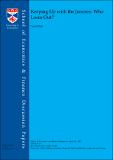Files in this item
Keeping up with the Joneses : who loses out?
Item metadata
| dc.contributor.author | Ulph, David Tregear | |
| dc.date.accessioned | 2014-10-20T16:01:03Z | |
| dc.date.available | 2014-10-20T16:01:03Z | |
| dc.date.issued | 2014-09-20 | |
| dc.identifier.citation | Ulph , D T 2014 ' Keeping up with the Joneses : who loses out? ' School of Economics & Finance Discussion Paper , no. 1412 , University of St Andrews , pp. 1-9 . | en |
| dc.identifier.issn | 0962-4031 | |
| dc.identifier.other | PURE: 155754987 | |
| dc.identifier.other | PURE UUID: c429fc33-c540-4a7b-aba7-ab6643347cc2 | |
| dc.identifier.other | ORCID: /0000-0003-3171-1270/work/59464508 | |
| dc.identifier.uri | https://hdl.handle.net/10023/5566 | |
| dc.description.abstract | This paper investigates how well-being varies with individual wage rates when individuals care about relative consumption and so there are Veblen effects – Keeping up with the Joneses – leading individuals to over-work. In the case where individuals compare themselves with their peers – those with the same wage-rate - it is shown that Keeping up with the Joneses leads some individuals to work who otherwise would have chosen not to. Moreover for these individuals well-being is a decreasing function of the wage rate - contrary to standard theory. So those who are worst-off in society are no longer those on the lowest wage. | |
| dc.format.extent | 9 | |
| dc.language.iso | eng | |
| dc.publisher | University of St Andrews | |
| dc.relation.ispartof | en | |
| dc.relation.ispartofseries | School of Economics & Finance Discussion Paper | en |
| dc.rights | (c) the author 2014 | en |
| dc.subject | Veblen effects | en |
| dc.subject | Consumer behaviour | en |
| dc.subject | Nash equilibrium | en |
| dc.subject | Wages and well-being | en |
| dc.subject | HB Economic Theory | en |
| dc.subject | SDG 12 - Responsible Consumption and Production | en |
| dc.subject.lcc | HB | en |
| dc.title | Keeping up with the Joneses : who loses out? | en |
| dc.type | Working or discussion paper | en |
| dc.description.version | https://doi.org/Postprint | en |
| dc.contributor.institution | University of St Andrews. School of Economics and Finance | en |
This item appears in the following Collection(s)
Items in the St Andrews Research Repository are protected by copyright, with all rights reserved, unless otherwise indicated.

